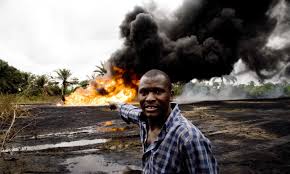By Jeph Ajobaju, Chief Copy Editor
A group of 42,500 residents in Ogale and Bille, farmers and fishermen who rely on the waterways of Ogoniland in Rivers State, have obtained the right to sue Shell in courts in England for environmental pollution that has decimated their livelihoods.
The United Kingdom Supreme Court ruled that affected Niger Delta areas can make their case for compensation in English courts, a victory for the communities after a five-year battle, which overturns a Court of Appeal ruling.
The plaintiffs say decades of pollution have severely affected their lives, health, and local environment. But Shell argued in court that it was only a holding company for a firm that should be judged under Nigerian law.
Shell described the legal ruling as disappointing.
What the ruling says
The BBC reports that the Supreme Court, the UK’s final appeal court for civil cases, ruled that the cases brought by the Bille community and the Ogale people of Ogoniland against Royal Dutch Shell were arguable and could proceed in the English courts.
Royal Dutch Shell did not dispute that pollution had been caused, but argued it could not be held legally responsible for its Nigerian subsidiary, its subsidiary Shell Petroleum Development Company (SPDC). Shell is responsible for about 50 per cent of the delta’s oil production.
SPDC is the operator of oil pipelines in a joint venture between the Nigerian National Petroleum Corporation (NNPC) which holds a 55 per cent stake, Shell which holds 30 per cent, France’s Total with 10 per cent and Italy’s Eni with 5 per cent.
A Shell spokesman said the decision was disappointing.
Last year the Court of Appeal agreed with the company, but the Supreme Court said the decision was flawed.
The communities, represented by law firm Leigh Day, argued Shell owed a common law duty of care to individuals who had suffered serious harm as a result of the systemic health, safety and environmental failings of one of its overseas subsidiaries.
Watershed moment in accountability
AlJazeera adds that Shell discovered and started exploiting Nigeria’s vast oil reserves in the late 1950s and has faced heavy criticism from activists and local communities over spills.
The Supreme Court ruled that there was an arguable case that UK-domiciled Shell, one of the world’s biggest energy companies, is responsible, in the latest test of whether multinationals can be held to account for the acts of overseas subsidiaries.
“(The ruling) also represents a watershed moment in the accountability of multinational companies.
“Increasingly impoverished communities are seeking to hold powerful corporate actors to account and this judgement will significantly increase their ability to do so,” Daniel Leader, partner at Leigh Day, said.
“UK common law is also used in countries like Canada, Australia and New Zealand so this is a very helpful precedent.”
The decision comes almost two years after a seminal ruling by the Supreme Court in a case involving mining firm Vedanta. The judgement allowed nearly 2,000 Zambian villagers to sue Vedanta in England for alleged pollution in Africa.
That move, Al Jazeera recalls, was seen as a victory for rural communities seeking to hold parent companies accountable for environmental disasters. Vedanta ultimately settled out of court in January.
Shell blames sabotage for spills
Members of Ogale and Bille communities allege their lives and health have suffered because repeated oil spills have contaminated the land, swamps, groundwater and waterways and that there has been no adequate cleaning or remediation.
A Shell spokesman expressed disappointment at the court judgment.
“Regardless of the cause of a spill, SPDC cleans up and remediates. It also works hard to prevent these sabotage spills, by using technology, increasing surveillance and by promoting alternative livelihoods for those who might damage pipes and equipment,” Shell said.
Shell has blamed sabotage for oil spills. It said in its annual report published last March that SPDC, which produces around one million barrels of oil per day, saw crude oil spills caused by theft or pipeline sabotage surge by 41 percent in 2019.
Shell CEO Ben van Beurden said earlier this month that the firm would take “another hard look at its onshore oil operations” in Nigeria.
Second court defeat for Shell this year
The court judgment is the second against Shell this year regarding claims against its Nigerian operations.
In a landmark Dutch ruling on January 31, an appeals court held Shell responsible for multiple oil pipeline leaks in the Niger Delta, which is at the heart of the Nigerian oil industry, and ordered it to pay unspecified damages to farmers, in a victory for environmentalists.
Leigh Day said the amount of compensation sought would be quantified as the case enters the trial stage.
In 2015, Shell agreed to pay out £55 million ($83.4 million) to the Bodo community in the Niger Delta in compensation for two oil spills, which was the largest ever out-of-court settlement relating to Nigerian oil spills.
Fresh hope for justice
The Niger Delta pollution has continued despite years of promises by successive governments in Nigeria to clean it up, says the BBC.
It recalls that President Muhammadu Buhari in 2016 launched an ambitious clean-up operation in Ogoniland. The work is ongoing but residents say little progress has been made.
Continued oil spills from the activities of multinationals have also cast doubt on the impact of the clean-up exercise. “Things are getting worse by the day,” Celestine Akpobari, an environmental activist from Ogoni, told the BBC.
The region provides most of Nigeria’s government revenues but the communities say successive governments have neglected them. Akpobari says people can no longer fish or farm because of the devastation.
“People are dying, there are strange diseases and women are having miscarriages” from the pollution, he says. But the communities and campaigners say the recent court victory gives them hope they will see justice.
Extent of the pollution
In 2011 the UN concluded it would take 30 years to clear up the vast amounts of pollution in the Niger Delta.
The Ogale community of about 40,000 people are mostly fishermen or farmers who rely on Ogoniland’s waterways. But pollution has all but destroyed fishing, turning their lush home into a toxic wasteland.
There have been at least 40 oil spills from Shell’s pipelines since 1989, lawyers say Shell’s records reveal.
UN scientists have found an 8cm (3 inch) layer of refined oil floating on top of water that supplies the community’s drinking wells – vastly higher than is legally permitted.
The water is now too dirty for people to drink. Despite promises to provide clean water, people must often either shell out for bottled water or drink from contaminated sources.
Thick crusts of ash and tar cover the land where oil spills have caused fires. Planting new vegetation to replace burnt crops or plants is almost impossible.
Farmer Damiete Sanipe describes a wasteland where the trees and the mangrove have been destroyed.
“The habitat is gone, the river we used to swim in is gone. For a coastal community whose life revolved around the water, it’s all gone.
“I don’t think money can bring back what we have lost. Even if they want to revive the mangrove, it will take more than 30 years which is a long time.”
Leigh Day lawyer Daniel Leader said the ruling was a “watershed” for “impoverished communities seeking to hold powerful corporate actors to account”.
The firm said the amount of compensation sought had yet to be determined.
Reaction from Shell
“The spills at issue happened in communities that are heavily impacted by oil theft, illegal oil refining, and the sabotage of pipelines,” Shell said in a statement.
It said despite the causes of the pollution, its subsidiary had worked hard to both clean up and prevent spills.
In 2006 a Nigerian court ordered Shell and partners to pay $1.5 billion to the Ijaw people of Bayelsa State for environmental degradation in the area.
In an ongoing civil case, the widows of four environmental activists executed by Nigeria’s military regime in 1995 are suing Shell for allegedly providing support to the military. Shell denies the claims.
The UK Supreme Court ruling is the latest case to test whether multinational companies can be held accountable for the acts of overseas subsidiaries.
Amnesty International welcomed the ruling.
Mark Dummett, director of Amnesty International’s Global Issues Programme, said the fight had not yet been won, but added: “This landmark ruling could spell the end of a long chapter of impunity for Shell and for other multinationals who commit human rights abuses overseas.”
Leigh Day also represented 2,500 Zambian villagers in their pollution case against UK-based mining giant Vedanta Resources. Last month the Supreme Court ruled in their favour and they won an undisclosed settlement.













